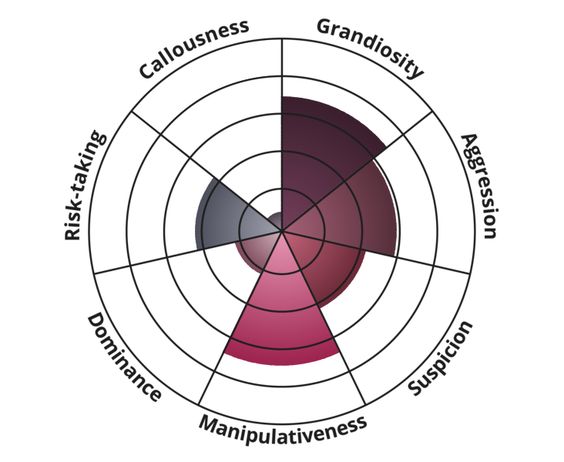Personality quizzes have been around for centuries. They have been popular since they were invented. But the difficult person test is one of the most unique. It went viral recently. You are probably wondering why? Well, with a series of first-person questions, the Difficult Person Test tells you more about your personality.
Reader's Roadmap
What is the Difficult Personality Test?
Have you taken the personality assessment test yet? Well, recently it went viral. One friend sent it to another, and then that friend sent it to 10 more friends, and you see how the chain works. Many people shrugged off the questions. The answers might seem obvious. But what many people noticed is that each and everyone gets a different result.
You might score on the easy to get along with side, but you will be surprised by the different range of the seven traits. Those are callousness, grandiosity, aggressiveness, suspicion, dominance, risk-taking, and manipulativeness.
Fun fact: almost nobody gets a 0% score. Meaning, nobody is a 0% difficult person. It turns out that no matter how easy you think you are, you probably have at least one annoying personality trait.
The test is based on Chelsea Sleep, a clinical psychology Ph.D. candidate at the University of Georgia, and her research. She studies darker personality traits for exactly that reason. She says, “I love thinking about how we conceptualize personality. I think that it’s particularly important for traits like antagonism, that can have significant implications for individuals”.
The online test went viral on platforms like TikTok and Twitter. People of all ages have been sharing their results and annoying traits. The hashtag #difficultpersontest encourages others to join in. Maybe the Covid-19 pandemic played a factor.
Explaining The Difficult Person Test
The test is self-report of psychological questions to identify how agreeable, compassionate, respectful, and sociable a person is. The standard DPT can do more. It can also reveal the levels of sociopathy and antagonism.
The personality assessment test started because of a 2020 study at the University of Georgia. The study showed that the five-factor model is the best way to identify a difficult individual.
The primary aim of the test is to evaluate the friendliness and sociability of a person. Higher levels of openness indicate a smaller chance of being a complicated individual.
And by the end of the questionary, any individual can receive pieces of expert advice on how not to be a problematic person.
The 7 Factors of the Test

Chelsea E. Sleep and her team came up with seven factors that determine whether you are a difficult person or not. Here are those:
- Callousness – lack of empathy
- Grandiosity – self-importance
- Aggressiveness – the possibility of violence
- Suspicious – not being able to trust
- Manupalitiveness – Machiavellian behavior
- Dominance – the urge to control others
- Risk-taking – being careless on purpose
Now, we have to stress that you do not need to have all the seven factors to be deemed a complicated individual or a problematic person. Rarely does someone has all seven traits. The beauty of this test and the reason why it went viral is each and every one of us has at least one trait.
What To Do If The Test Says You Are A Difficult Person?
Now, nobody wants to think of himself/herself as a difficult individual. But what happens when you get the results and the test results say exactly that? Well, you are probably asking, “How can I avoid being so difficult”? What to do with all the negative traits?
Do not worry, we have a couple of tips and suggestions.
Do not judge people as much
The simple trick is fewer judgments and more questions. People who are tolerable and agreeable are open-minded. So, instead of evaluating others and trying to judge them, ask more questions. Let them explain their intentions.
Let your assumptions go
People who are disagreeable often hold assumptions about others. That makes them unlikeable people. If you get a positive DPT, you have had those assumptions and suppositions. You should never say something like, “everyone is stupid”. That is a red flag.
Do not categorize and generalize people. Let go of such hypotheses.
Integrating the concept of DISC assessments can offer valuable insights and strategies for personal development. The DISC assessments introduction to understanding your own behavioral styles could be the key to unlocking more effective communication and improving interpersonal relationships. By recognizing your DISC profile, you can learn how to adapt your behavior in ways that mitigate negative traits and enhance your interactions with others.
Help others
The trick here is to help people without expecting something in return. Give without expecting to receive. Or as we like to say it, offer unconditional support. That is the key to being friendly and agreeable.
Now, there is a limit. Do not overdo it and let others abuse your kindness.

What Do You Need To Know Before Taking The Quiz?
Before you take the difficult person quiz, we like to point out and stress some things. Here are a few reminders.
Being Unfriendly Is Not A Mental Disorder
Take the results of the test lightly. If you are a difficult person, that doesn’t mean you have a mental disorder. Being disagreeable is not a mental health issue. Yes, the positive test might be worrying, but work on the problem.
You Cannot Spot Difficult People
Some people say they have an instinct for a difficult person. But that is not always true. How many times have you fallen into the trap of thinking someone was a great person and turns out to be the worst? Or you have a negative opinion about someone, and then you get to know that person. He/she turns out to be a delightful person.
So, do not expect to know everything about everyone.
The Results Are Not Your Excuse For Being A Toxic Person
Now, this is the most important thing about the test. If you are a toxic individual, do not use the results as a justification for your actions.
You should not use the results as a way to get away with toxicity. The traits in the test might hurt people around you. And you definitely do not want that, right?
Conclusion
If you after all decide to take the test, you have to understand your actions. We all know someone who is high in the unpleasant quality of antagonism. Maybe you are such a person.
Turning to research that can explain behavior is a double-edged sword. You might find it surprising to learn more about yourself. You might be surprised about the level of antagonism you have.
Chelsea Sleep and her colleagues at the University of Georgia believe that antagonism fits quite well into the widely-accepted Five-Factor Model or FFM of personality traits.
FFM defines personality as a set of five traits. Those are openness to experience, conscientiousness, extraversion, agreeableness, and neuroticism. The best way to remember it? It spells OCEAN.
But Chelsea and her team expanded on those five traits with two more. Now, the question for most people is how well does the research-based picture of an antagonistic person fit into your own notion of a difficult individual?
We have to stress this. People high in antagonism can take away from your own sense of well-being. So, try to stay away from such people.







Leave a Reply
View Comments